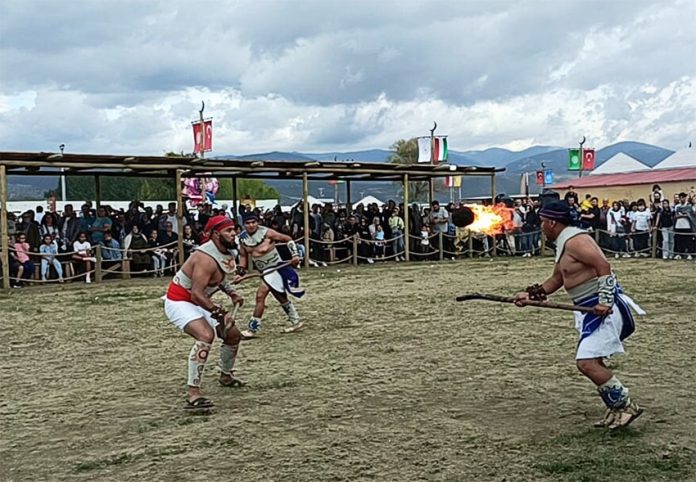You won’t find the ancient Purépecha sport of pelota in the Olympics or Pan American Games, but it was a big hit recently at the fourth World Nomad Games in Turkey.
The biennial competition aims to showcase non-mainstream ethnic sports that have been handed down through the generations.
Most of the sports are from Central Asia, but this year a team from Mexico put on a display of pelota, a Purépecha sport using balls and long sticks — sort of like field hockey or the Scottish sport of shinty — that has roots in what is now the state of Michoacán dating back some 3,500 years.
“Everyone was very amazed by the performance that we carried out,” said Ana Claudia Collado García, president of the Mexican Federation of Indigenous and Traditional Sports and Games.
Let’s get acquainted with Pelota Purépecha, one of world’s most interesting and inveterate games. 🔥
This game is from Mexico and enlivened the World Nomad Games. 🍀 pic.twitter.com/KLWfGRGdBB
— World Ethnosport Confederation (@worldethnosport) October 19, 2022
The players from Mexico explained the origins of the game, showed the two types of balls used (one of them soaked in fuel and ignited), and covered the rules and the meaning of the game. They also played some exhibitions, a few of them in a 15,000-capacity stadium used for the opening ceremonies. Fans and others were invited to give the sport a try if they wanted to.
“People were very interested,” said Collado, whose agency is part of Mexico’s Multilingual and Community Cultural Actions Program (PACMYC). She said it was the first time that Mexico had participated in an event of this nature.
The first three World Nomad Games were held in 2014, 2016 and 2018 in Kyrgyzstan; after a hiatus for COVID, the games returned this year from Sept. 29 through Oct. 2 in Iznik, Turkey. More than 3,000 athletes from 102 countries were said to have participated.
“P’urhepecha Ball” — according to the website for the 2022 Games — “continues to be practiced by [I]ndigenous communities” and is played on courts that are 120 meters long and 6-to-8 meters wide, with six to eight players on each team.
“The ball is hit with a wooden cane with a curve on the lower side (similar to a hockey stick). It has two main modalities: One is practiced during the night with a lit wooden ball, the other one is played during the day with a cloth ball. To score a point, the ball has to cross” the end line of the other team, the website says.
The game begins with a “faceoff” in which two opposing players hit their sticks three times against one another before the ball is put into play.
“The antecedents of the [game] go back to the first settlers of what is now Michoacán,” the website continues. “A legend in Michoacán tells that when the planet Mars was reborn and unleashed natural catastrophes against the Earth, the P’urhépecha people invented the ballgame as a remedy to level the cosmos.”
The Purépecha are an Indigenous people whose population is mainly concentrated in 22 municipalities in central Michoacán, including Pátzcuaro, Quiroga, Tzintzuntzan, Paracho and Uruapan, and other smaller towns and villages that are more remote. Speakers of the P’urhé language are in 95 of the 113 municipalities of the state.
Some of the other sports contested at the World Nomad Games — at which medals are handed out — include alysh (a type of belt wrestling), salburun (which combines falconry, archery and hunting) and kok-boru (a sport similar to buzkashi, in which horseback riders attempt to move a goat or calf carcass into a goal). Don’t expect to see that one on ESPN.
With reports from Excelsior
